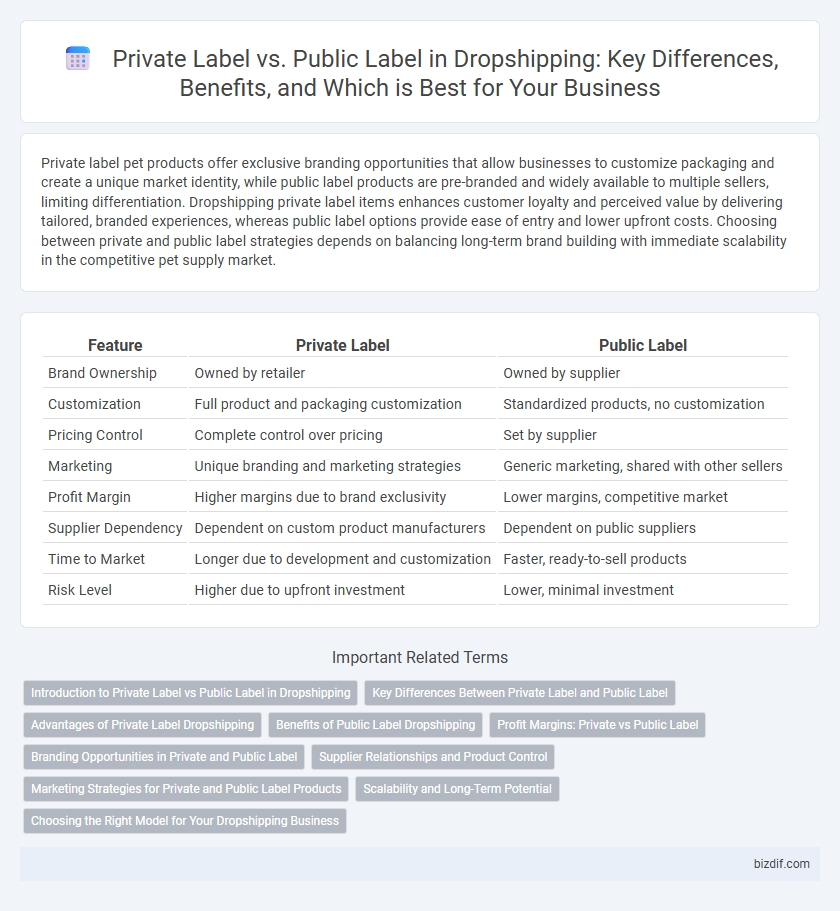Private label pet products offer exclusive branding opportunities that allow businesses to customize packaging and create a unique market identity, while public label products are pre-branded and widely available to multiple sellers, limiting differentiation. Dropshipping private label items enhances customer loyalty and perceived value by delivering tailored, branded experiences, whereas public label options provide ease of entry and lower upfront costs. Choosing between private and public label strategies depends on balancing long-term brand building with immediate scalability in the competitive pet supply market.
Table of Comparison
| Feature | Private Label | Public Label |
|---|---|---|
| Brand Ownership | Owned by retailer | Owned by supplier |
| Customization | Full product and packaging customization | Standardized products, no customization |
| Pricing Control | Complete control over pricing | Set by supplier |
| Marketing | Unique branding and marketing strategies | Generic marketing, shared with other sellers |
| Profit Margin | Higher margins due to brand exclusivity | Lower margins, competitive market |
| Supplier Dependency | Dependent on custom product manufacturers | Dependent on public suppliers |
| Time to Market | Longer due to development and customization | Faster, ready-to-sell products |
| Risk Level | Higher due to upfront investment | Lower, minimal investment |
Introduction to Private Label vs Public Label in Dropshipping
Private label products in dropshipping are manufactured by a third party but branded and marketed under the retailer's name, allowing for greater control over branding and customer loyalty. Public label products, on the other hand, are generic items sold under the manufacturer's brand or commonly available branding, often resulting in less differentiation and price competition. Choosing between private label and public label dropshipping strategies depends on factors like brand identity, profit margins, and market positioning.
Key Differences Between Private Label and Public Label
Private label products are manufactured by a third party but sold under a retailer's brand, allowing full control over product design, packaging, and marketing. Public label items, conversely, are generic products sold by multiple retailers under the manufacturer's brand or a generic label, limiting customization options. The primary differences lie in branding control, product exclusivity, and pricing potential, with private label enabling unique market positioning and higher profit margins.
Advantages of Private Label Dropshipping
Private label dropshipping offers brand control, allowing sellers to customize products and packaging to build a unique identity that fosters customer loyalty. This approach enables higher profit margins through exclusive products and reduces competition by differentiating from generic public label items. Private label also enhances marketing opportunities, creating a professional and trustworthy image that drives long-term business growth.
Benefits of Public Label Dropshipping
Public label dropshipping offers the advantage of established brand recognition, reducing marketing efforts and increasing customer trust. Retailers benefit from access to a wide range of products without the need for inventory investment or large upfront costs. Moreover, public label dropshipping streamlines supply chain management by leveraging suppliers' existing logistics and fulfillment expertise.
Profit Margins: Private vs Public Label
Private label products typically offer higher profit margins due to exclusive branding and reduced competition, enabling sellers to set premium pricing. Public label products often have lower profit margins because they are widely available from multiple retailers, driving prices down through competition. Optimizing profit in dropshipping requires a strategic choice between the unique value of private label and the accessibility of public label products.
Branding Opportunities in Private and Public Label
Private Label dropshipping allows businesses to create unique branding and customize products, fostering stronger brand identity and customer loyalty. Public Label products offer less flexibility in branding, typically promoting the manufacturer's brand, which limits differentiation in competitive markets. Choosing Private Label enables entrepreneurs to develop exclusive packaging, logos, and marketing strategies that enhance brand recognition and value.
Supplier Relationships and Product Control
Private label dropshipping offers greater product control, enabling sellers to customize branding and packaging directly with suppliers, fostering stronger, long-term partnerships. Public label arrangements often involve standardized products with limited supplier interaction, resulting in less flexibility over product features and quality. Building reliable supplier relationships in private labeling enhances consistency, exclusivity, and competitive advantage in the dropshipping market.
Marketing Strategies for Private and Public Label Products
Private label products benefit from tailored marketing strategies that emphasize brand differentiation, customer loyalty, and unique value propositions through custom packaging and exclusive product features. Public label products often rely on broad, price-competitive marketing approaches, leveraging widespread availability and generic appeal to attract cost-conscious consumers. Effective dropshipping campaigns integrate social media advertising, influencer partnerships, and search engine optimization tailored to the specific branding goals of private or public label products.
Scalability and Long-Term Potential
Private label dropshipping offers greater scalability and long-term potential by allowing full brand control and customization, which enhances customer loyalty and market differentiation. Public label products often face limitations in branding and differentiation, restricting growth opportunities and long-term sustainability. Entrepreneurs seeking to scale and build a lasting business benefit from investing in private label strategies for unique product offerings and stronger market positioning.
Choosing the Right Model for Your Dropshipping Business
Private label dropshipping allows you to create a unique brand by customizing products with your logo and packaging, enhancing customer loyalty and perceived value. Public label dropshipping involves selling generic products under the supplier's brand, requiring less investment and faster market entry but limiting differentiation. Selecting the right model depends on your budget, branding goals, and market competition to maximize profitability and business growth.
Private Label vs Public Label Infographic

 bizdif.com
bizdif.com